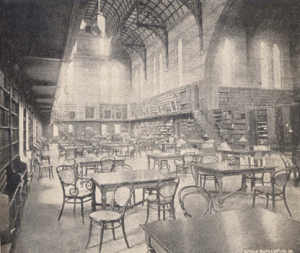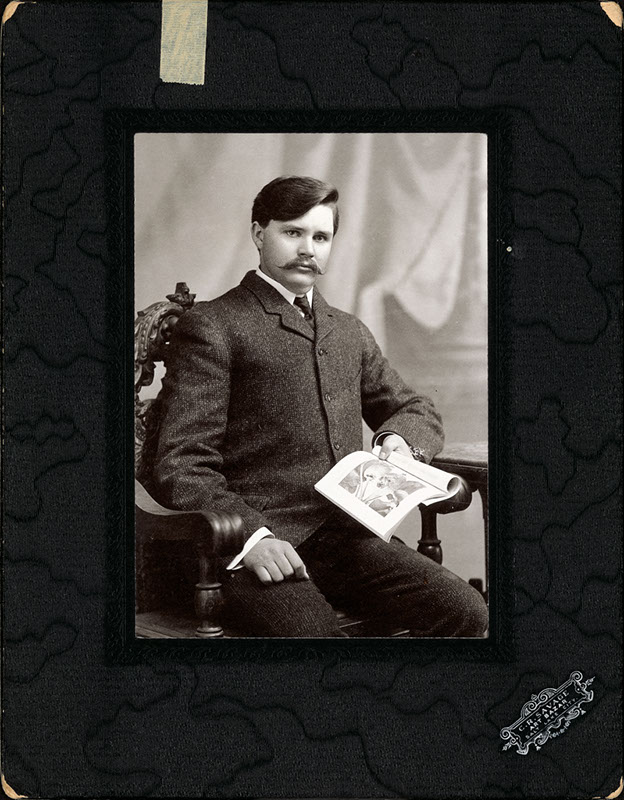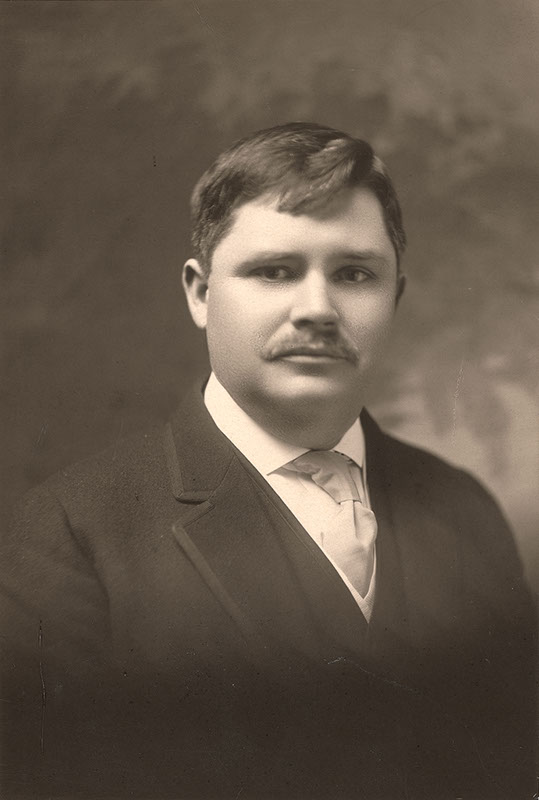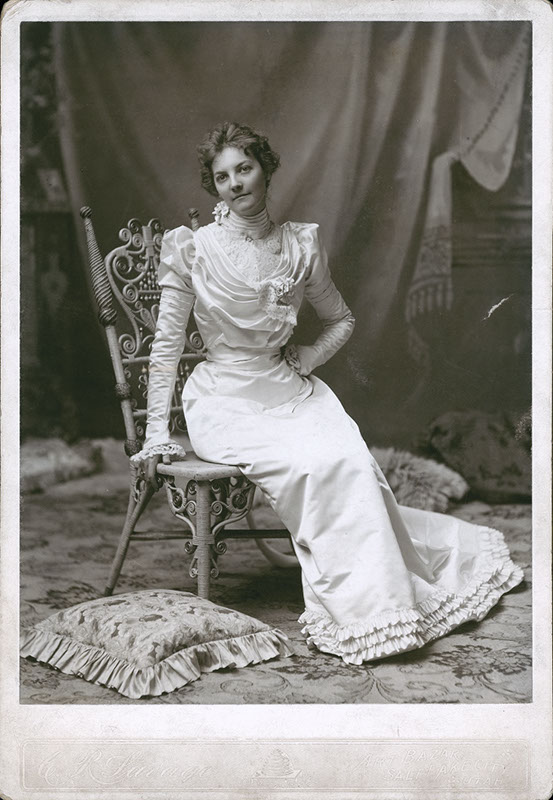J Reuben Clark met Luacine (“Lute”) Annetta Savage of Salt Lake City in 1894, but he was still a student and too poor and busy to marry. Lute came from a refined family. She and Reuben socialized for years. She attended college, but refusing to take algebra, didn’t graduate. She taught kindergarten, then worked in her father’s store during the years she and Reuben dated, while he was at school. After Reuben graduated from the University of Utah and procured the promise of employment, he and Lute felt that they could finally marry.
 They married on September 14, 1898, in the Salt Lake Temple of The Church of Jesus Christ of Latter-day Saints. James E. Talmage officiated at their “temple sealing,” wherein marriage vows are entered into for eternity. Lute arranged a very modest reception, because of the meager circumstances of Reuben’s family, even though her own parents could have invested more in the celebration. The couple were married just before Reuben was to report to teach and be the principal at the new Heber City High School.
They married on September 14, 1898, in the Salt Lake Temple of The Church of Jesus Christ of Latter-day Saints. James E. Talmage officiated at their “temple sealing,” wherein marriage vows are entered into for eternity. Lute arranged a very modest reception, because of the meager circumstances of Reuben’s family, even though her own parents could have invested more in the celebration. The couple were married just before Reuben was to report to teach and be the principal at the new Heber City High School.
J Reuben Clark’s Early Employment
Reuben left his wife of two days to find a place to live in Heber. After 10 days Lute followed him, because she was lonely. She wrote in her journal that this was the beginning of being left alone while Reuben traveled. They had a difficult time finding housing in Heber. They ended up in two rooms in the upstairs of the school’s trustee, without any conveniences, but it was a happy six months. The following March, Lute went to Salt Lake City to spend the last several months of her first pregnancy. Their first child, a daughter they named Louise, was born in July, three weeks early. Reuben’s mother went to Salt Lake City to help with the birth, since Lute’s mother had died when she was a child.
Following his brief stay in Heber, Reuben signed as a teacher at Latter-day Saints College in Salt Lake City, but he resigned in February 1990 to teach at Salt Lake Business College. The school later became part of LDS College. Joseph Nelson headed the college and became a close friend and patron to Reuben. In the fall of 1900 Reuben transferred to Cedar City in southwestern Utah to be principal of the Southern Branch of the State Normal School. The small family lived in a “very pleasant home,” according to Lute’s journal. Reuben was very happy there and made many improvements. While the Clarks were in Cedar City, there was a smallpox epidemic, and only vaccinated children were allowed in school. Lute took almost-2-yr-old Louise and went back to Salt Lake City. Lute was pregnant with their second child at the time. (They eventually would have four children.) She departed a month before school ended.
Marianne born in the fall, and the family obtained a home of their own on 1st Avenue in Salt Lake City. From June of 1891, Reuben worked at the Salt Lake Business College as an instructor in commercial law, principal of the Shorthand Department, and secretary of the faculty. In 1903 Joseph Nelson was made cashier of the Utah National Bank, and nearly all his school administrative duties were placed upon Reuben.
J Reuben Clark Enters Law School
In 1903 Nelson offered to pay Reuben’s way to law school. Reuben had been driven to study law. He had been studying on his own and was anxious to go into practice. That fall Reuben’s little family left for Columbia Law School in New York City. They rented a flat, and Lute took in roomers and boarders to make ends meet. As soon as Reuben graduated and was employed, he paid back the money Nelson had spent.
This was a difficult transition for Lute. She had to leave her family in Utah, and wondered how they could survive in more expensive New York City, especially with the cost of rent and other necessary expenses they would face. Her worry lifted with the bequest of Joseph Nelson, but the family still lived as frugally as possible—so frugally, that Lute and the children were able to visit in Utah every summer. Lute later recalled that “…in a cheap way we managed to see all the sites and have good social times.” [1] Reuben later said of Nelson, “I owe to this man…a greater debt than I have been able to pay or ever shall” in this life. He it was who provided me…the opportunity out of which has come whatever experience I have had.” [2]
Reuben described himself as “a poor young man with a wife, and two children,” having “no property,” “without any security” with actually “nothing but what might be called an urgent desire to study.” [3] (The Clarks would eventually have four children — Louise, Marian, J. Reuben Clark III, and Luacine.)
 Columbia Law School was founded in 1858. At the time Reuben entered the law school in 1903, the enrollment was 406 students. With a total enrollment of 5,352 students, Columbia was America’s second largest university, after Harvard. After meeting in various sites around the city, by 1903 all of the law classes were taught at the 116th Street campus. At that time the law library contained about 30,000 volumes. The university library was the second largest with 351,000 volumes. [4] Columbia Law School had an extremely distinguished faculty.
Columbia Law School was founded in 1858. At the time Reuben entered the law school in 1903, the enrollment was 406 students. With a total enrollment of 5,352 students, Columbia was America’s second largest university, after Harvard. After meeting in various sites around the city, by 1903 all of the law classes were taught at the 116th Street campus. At that time the law library contained about 30,000 volumes. The university library was the second largest with 351,000 volumes. [4] Columbia Law School had an extremely distinguished faculty.
Reuben’s work was of such high quality that in the beginning of his second year, he was one of the first three of several 2nd-year students elected to the editorial board of the Columbia Law Review. He was the oldest on the board, the only one married on the board, and of course, the only Mormon in the law school. Mormons were in the news then, especially, because of the controversy over seating Mormon Reed Smoot in the U.S. Senate.
In the process of serving on the Law Review’s editorial board, Reuben
“…acquired a familiarity with the Law Library that [he] thought was very good.” “There were almost none of the reports I did not know, and I could find my way about in the Library; this included both English reports, American reports, State reports, and Canadian reports, all of the countries that had to do with the common law.” [5]
 In 1905, at the end of his second year of law school, Reuben was admitted to the New York bar. He was granted a Bachelor of Laws degree in 1906. Reuben had worked with Dr. james Scott Brown on a 772 page book on quasi-contracts. During 1905-1906, Reuben served as the Recent Decisions editor of the Review.
In 1905, at the end of his second year of law school, Reuben was admitted to the New York bar. He was granted a Bachelor of Laws degree in 1906. Reuben had worked with Dr. james Scott Brown on a 772 page book on quasi-contracts. During 1905-1906, Reuben served as the Recent Decisions editor of the Review.
J Reuben Clark is Called into Public Service
After graduation, Lute hoped to settle down in Salt Lake City, and at least was able to spend the summer there (where the heat was more bearable), but Reuben was hired by Scott to do similar work. He was employed by Scott “to compile and annotate the major portion of two volumes of cases on the origin, growth, and development of equity, the nature of equity jurisdiction, the grounds of equitable jurisdiction, the fundamental principles and maxims controlling the administration of equity, equitable rights predicted upon accident, and an elaborate series of cases devoted to the equitable remedy of specific performance. [6]
Scott had become Solicitor for the Department of State of the U.S. Government. Dr. Scott, knowing the integrity, industry, and quality of work of J. Reuben Clark, recommended him as Assistant Solicitor of the Department of State.
As the appointment was considered, Lute wrote to Reuben:
Is your job sure? I fear with opposition you will stand a poor show if they find out you are a Mormon. I was delighted to hear you are the Assistant but won’t count on it too much, for you have had so many disappointments. The salary pleases me most of all, for I want to see you enjoy life as soon as possible financially. [7]
 Reuben received the appointment on 5 September 1906. This appointment would lead him into the association with the great and powerful and give him a venue to wield a potent influence for good among men and nations. His advice would be solicited by the powerful in industry and finance. His counsel would be sought by the mighty in government.
Reuben received the appointment on 5 September 1906. This appointment would lead him into the association with the great and powerful and give him a venue to wield a potent influence for good among men and nations. His advice would be solicited by the powerful in industry and finance. His counsel would be sought by the mighty in government.
In response to the appointment, Reuben’s father wrote:
Dear Son,
I congratulate you if congratulations are not too late. I feel that you have been honored and we feel that we have also been honored. You have worked long and hard but the reward has come. This, or the position to which you have attained is a stepping stone to something higher and better. Success comes to those who are persistent in their efforts.
I wrote to Mr. Scott several days ago expressing as best I could our appreciation of his efforts in your behalf. You have been very fortunate in having the assistance of such men as Talmage and Scott to help you in climbing the hill.
You have also had the silent petitions of a father and mother to the Great Giver of all good, and I feel that our petitions have not been in vain. And I am satisfied that you have not forgotten those little devotions taught at your mother’s knee. Don’t forget the Lord and he won’t forget you. I realize that you are surrounded many times with influences that perhaps have a tendency to draw you away from the path of true devotion. Your time and attention is taken up with your profession during the day, but when alone in your bed chambers throw off the cares of the day and commune with your Creator for a short time. You will find it very refreshing and your slumbers will be soothing and peaceful. Now my son, I do not know why I have written this way, but the older I get the more I reflect upon the future and the greater concern I have for my children. I don’t want you to think that I doubt your integrity to the Church for I believe that the early impressions of your youth will always linger with you. [8]
Joshua Clark’s impressions proved to be prophetic. After serving remarkably in the public sphere, J. Reuben Clark, Jr. went on to be a General Authority of The Church of Jesus Christ of Latter-day Saints.
See also: The Legacy of J. Reuben Clark
[1] “Notes” from Lute’s autobiography, p. 8.
[2] Nelson Funeral, pp. 2-3.
[3] Nelson Funeral, p. 1.
[4] Yarn, David H., Young Reuben: The Early Life of J. Reuben Clark, Jr., Brigham Young University, 1973.
[5] Parkinson, George D., “How a Utah Boy Won His Way,” Improvement Era, April 1914, p. 559.
[6] Parkinson, p. 559. See also Scott, James Brown, Cases on Equity Jurisdiction in Two Volumes (New York: Baker, Voorhis & Company, 1906).
[7] Yarn, p. 132.
[8] Letter from Joshua Clark to J. Reuben Clark, Jr., 21 September 1906.

